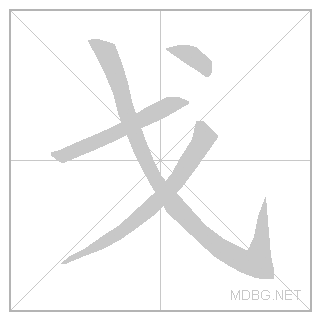By Gene Ching
Wulin (武林) is a term used both in wuxia fantasies and within real world of Chinese martial arts. It refers to the counterculture community of martial arts masters. The literal translation of Wulin is ‘martial forest’ however like so many aspects of Chinese culture, that’s just the simple short answer. To get to the roots of its meaning, we must see the forest for the trees.

Wu (武) translates as ‘martial,’ ‘military,’ or ‘warlike.’ This is the same wu as in Wushu (martial arts 武術) and Wuxia (martial hero 武俠). When converted to Japanese, it becomes bu as in Bushido (martial solider way 武士道). Chinese characters are pictograms, and it is commonly believed that the character combines radicals for stop and spear, specifically an ancient Chinese polearm known as a ge (戈). The ge is often called a dagger-axe because all that remains are the spearheads which resemble a hybrid between dagger and axe. These saw use in the first few centuries prior to the common era, so the polearm poles have long disintegrated. The other radical believed to be zhi (止) which means ‘stop.’ Keep in mind that this is an ancient character, well over two millennia old, as we shall see in this essay, so the roots are hidden.


The common interpretation of the combination of the hand radical combined with the ge radical is ‘stop the spear.’ The implication is that martial arts are used to stop the spear – to end the fight and restore peace. However, there’s a much deeper story.


In an article by Adrian Chan-Wyles Ph. D titled Wu Qi: Combat Energy – The Chinese Concept of Wu the author proposed an interpretation that was different and from a scholarly basis. It was published in the JAN+FEB 2006 issue of Kung Fu Tai Chi magazine.
It was in the first Chinese dictionary, Shouwen Jiezi (Explaining simple and analyzing compound characters) by Xu Shen (147 CE), where we find the first evidence of this definition. King Chu of the Spring Autumn period (770-476 BCE) defined wu as ‘stop the spear.’ However, recent research refutes this claim. Xu Zhongsu asserts in his 1990 work Jia Gu Wen Zidian (Tortoise shell character dictionary) that King Chu’s assertion was incorrect and that zhi descends from the root character for ‘foot’ not ‘stop,’ implying marching. Xu is one of several scholars who maintain this claim. Lian Yin claimed in his 1979 work Wenzi Yuanliu Qianshou (Light discussion on the origin of characters) that wu was comprised of three ancient radicals that meant ‘weapon,’ ‘foot,’ and ‘crossroads.’ He suggests that King Chu’s definition may have been the result of political propaganda. Perhaps wu doesn’t mean ‘stop the spear.’ Perhaps wu means ‘march off to war.’
Whatever the case may be, lin is a simpler character to define, as well as a good teaching moment regarding the pictographic nature of Chinese. Lin (林) means ‘woods’ or ’forest’ and it combines two twin characters, namely mu (木) which means ‘tree,’ or ‘wood’ as in one of the basic five elements of Chinese cosmology. Surely you can see the tree in those characters. If three mu radicals are combined, it’s sen (森) which also means ‘forest’ although a bigger one than lin. Senlin (森林) means ‘jungle.’

So why is lin used in Wulin? Heck if I know. Despite dabbling into Chinese character research like this, I’m far from a scholar of Chinese language. I’m not even fluent in Chinese. Personally, I’ve always wanted to attach it to Shaolin (少林) as in Shaolin Temple. Some have told me that this is indeed the case, but those same Chinese ‘mansplainers’ are often the same pontificators of ‘stop the spear’ and are probably shocked to read the earlier observations on the recent research findings of actual scholars about wu presented above. What do they know? Their assumptions are often based solely upon what they’ve heard, often from wuxia movies and novels. Those are the fruits of our martial tree, not the roots. Shao means ‘little’ and the name is geographic referencing the name of the area, not a martial thing.
Personally, I love the term Wulin because it’s so evocative, not just for the fantasy masters who fly about delivering qi blasts in wuxia stories, but for the authentic masters of Kung Fu. It’s like the Jedi, or the wizarding world, or even the superhero universes. But it’s very real, or at least some aspects of it are. While we don’t have lightsabers, wands, or batmobiles, we do have swords, spears, three-section staffs, and all manner of unique weaponry, and many of the Wulin genuinely know how to use them.
On another personal note, I’ve always preferred the term Jianghu (江湖) to refer to the martial community. That’s more of a wuxia term, not generally bandied about in real world circles. Jianghu means ‘rivers and lakes’ and it evokes the romantic image of wandering warriors travelling the rivers and lakes of China on quests, missions, doing good deeds or bent upon revenge.
But that’s another story…


Gene Ching is the author of Shaolin Trips, the publisher of KungFuMagazine.com, a Staff Writer for YMAA Publication Center, and he is a 32nd generation layman disciple of the Shaolin Temple in Henan, China, a certified Provost at Arms in Fencing, and served as a weapons expert for the TV show Man at Arms: Art of War. He also writes for the pop culture website Den of Geek. Gene worked alongside Patrick Lugo for over twenty years until the pandemic folded the print magazine. Whether he survived that experience with his sanity intact is questionable.


1 thought on “Wulin: The Martial Forest”